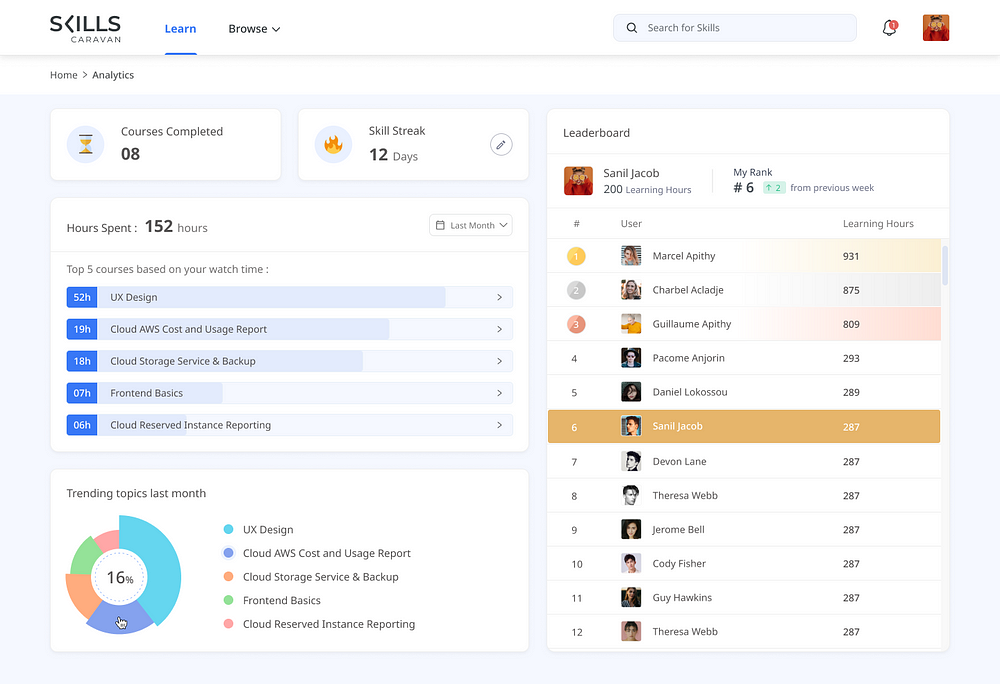How a White Label LMS Can Transform Corporate Learning and Brand Identity
In today’s rapidly evolving digital workplace, businesses are increasingly turning to eLearning platforms to deliver impactful, efficient, and scalable training. While traditional Learning Management Systems (LMS) serve their purpose, companies seeking a more personalized, brand-consistent experience are now embracing White Label LMS solutions. These platforms not only streamline employee learning but also reinforce brand identity and enhance corporate culture.
In this blog, we’ll explore how a White Label LMS can revolutionize corporate learning while strengthening your brand presence from the inside out.

What is a White Label LMS?
A White Label LMS is a fully customizable learning management system that allows companies to rebrand and tailor the platform to their own identity. Unlike generic LMS platforms that carry the provider’s branding, a white label LMS can be customized with your company’s logo, color scheme, domain, language, and even user interface elements.
This enables businesses to offer a seamless and cohesive experience to employees, partners, and clients — as if the platform was built in-house.
1. Boosting Brand Identity Through Customization
Your brand is more than just a logo; it’s your voice, tone, and culture. A white label LMS allows you to extend that identity into the digital learning space. From login screens and dashboards to course certificates and email notifications, everything can reflect your brand aesthetics.
This level of branding consistency builds trust, enhances professionalism, and reinforces your company’s values in every training interaction. Employees feel more connected and aligned with the company’s mission when they engage with a platform that feels like a true extension of the brand.
2. Enhancing Learner Engagement
Engagement is critical for the success of any learning initiative. A White Label LMS helps foster a sense of familiarity and trust, which directly boosts learner motivation.
When learners interact with a branded platform that mirrors their workplace culture, it reduces resistance to training and increases retention. Features like gamification, personalized dashboards, and mobile accessibility further make the learning experience more enjoyable and effective.
3. Flexibility to Meet Unique Business Needs
Off-the-shelf LMS platforms often come with limitations. With a white label LMS, companies have full control over how they structure and deliver content. Whether it’s onboarding new hires, upskilling employees, or training clients, a white label LMS adapts to your specific goals.
You can integrate your LMS with internal tools (like CRM or HR software), customize reporting dashboards, automate workflows, and set user permissions that match your organizational structure.
4. Deliver Consistent Training Across Locations
For organizations operating in multiple locations or serving a global audience, consistency in training is essential. A white label LMS ensures that every team, regardless of geography, receives standardized content presented under the same branded experience.
Multi-language support, region-specific modules, and centralized reporting features make it easier to manage and measure training outcomes company-wide.
5. Empowering Client and Partner Education
Many companies extend training beyond internal teams to partners, vendors, and customers. A White Label LMS helps maintain a professional and consistent brand experience across all external learning initiatives.
Imagine offering your clients product tutorials or certifications on a platform that looks and feels like a native part of your brand. This not only positions your company as an authority but also builds customer loyalty and satisfaction.
6. Cost-Effective and Scalable
Building a custom LMS from scratch is expensive and time-consuming. A white label LMS offers the best of both worlds — the reliability of a proven platform and the flexibility of full customization — at a fraction of the cost.
As your organization grows, a white label LMS grows with you. Whether you’re training ten employees or ten thousand, the platform can scale without compromising performance or user experience.
7. Data-Driven Decisions and Compliance
Corporate learning isn’t just about content delivery; it’s about measurement and improvement. White label LMS platforms offer in-depth analytics and reporting features that help track learner progress, course effectiveness, and compliance.
This is particularly critical for industries with strict regulatory requirements. With real-time dashboards and exportable reports, your company can ensure every employee is up-to-date on mandatory training and certifications.
8. Faster Time-to-Market
A white label LMS solution is ready-to-go, with customizable elements that significantly reduce setup time. Unlike custom-built systems that can take months or years to launch, white label platforms allow you to deliver training programs in days or weeks.
This speed-to-market advantage is crucial in dynamic industries where training must evolve quickly to keep pace with change.
9. Improved ROI on Training
By combining cost savings, faster deployment, higher engagement, and better analytics, a White Label LMS significantly improves the ROI of your learning programs. You can spend less time managing training logistics and more time focusing on strategic growth and performance improvement.
10. Stay Competitive and Future-Ready
The modern workforce expects a digital-first, user-friendly learning environment. Offering a polished, branded LMS experience not only positions your company as a tech-savvy leader but also helps attract and retain top talent.
As business models shift and remote work becomes permanent, a white label LMS ensures your training infrastructure is resilient, future-proof, and aligned with digital transformation goals.
Conclusion
A White Label LMS is more than just a training tool — it’s a strategic asset that can transform how your company educates, engages, and empowers its people. From enhancing corporate learning to reinforcing brand identity, the benefits are far-reaching and long-lasting.
Whether you’re a startup looking to scale your workforce or an enterprise seeking better alignment across departments and regions, investing in a white label LMS can set the foundation for a smarter, stronger organization.

Comments
Post a Comment